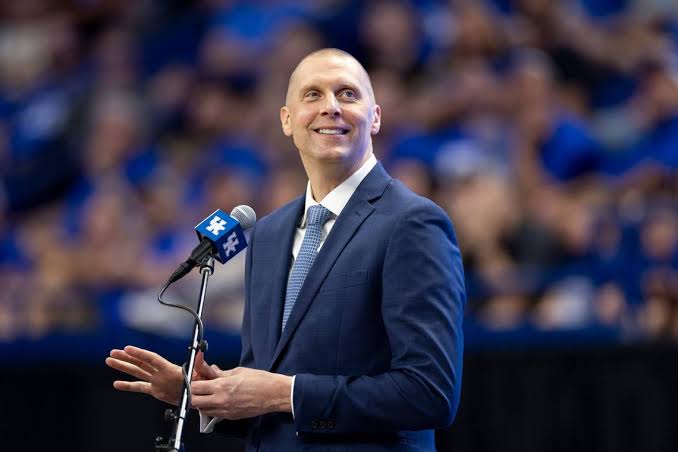It appears there is no verified information regarding Mark Pope agreeing to a $563.9 million contract with the Louisville Cardinals men’s basketball team, as of now. While this figure seems extravagant and unusual, there could be confusion or misinformation regarding contracts in the world of college basketball. Mark Pope is, in fact, a well-known figure in college basketball coaching, but no current reports substantiate the claim that he’s agreed to such an extensive deal with Louisville.
To clarify, Mark Pope is the current head coach of the University of Kentucky Wildcats, having been hired in 2024. His contract with Kentucky reportedly totals a more modest sum of $27.5 million over five years, an agreement reflecting the highly competitive nature of college basketball coaching salaries, but it falls far short of the claimed $563.9 million.
Historically, contracts in the college basketball world have been substantial, but no deal in recent memory has approached this magnitude. Even top-tier programs like Louisville, Kentucky, and others with high-profile coaching staffs rarely offer contracts anywhere near half a billion dollars.
To understand the situation better, let’s take a closer look at Mark Pope’s career and the world of college basketball coaching contracts.
### Mark Pope’s Coaching Career
Mark Pope is a name recognized in college basketball circles for his success at Brigham Young University (BYU). Before taking the helm at Kentucky, Pope built a solid coaching record at BYU from 2019 to 2024. During his time at BYU, Pope led the Cougars to two NCAA Tournament appearances, establishing himself as a leader who could turn a program around.
Pope’s coaching philosophy emphasizes strong team defense, up-tempo offense, and player development. His ability to nurture talent has made him a sought-after coach, and his move to Kentucky was seen as a big step in his career. Kentucky, with its rich basketball history, is one of the most storied programs in college basketball, and Pope’s hiring was viewed as a forward-thinking move by the Wildcats.
### The Competitive World of College Basketball Coaching Contracts
Coaching contracts in the world of college basketball have steadily risen in recent years. As college basketball has become increasingly lucrative, so too have the salaries of coaches, particularly at the highest levels.
Top-tier programs like the University of Kentucky, the University of Louisville, Duke, and Kansas regularly pay their head coaches multi-million-dollar contracts. For instance, Kentucky’s previous coach, John Calipari, was earning upwards of $9 million annually before Pope’s arrival. Coaches at other top programs have similar contracts, though they typically hover around $5 to $8 million per year, depending on the stature of the school and the coach.

However, even for a high-profile program like Louisville, a $563.9 million contract would be far outside the norm. For perspective, that amount exceeds the combined salary of many NBA teams’ rosters for a season. It is unlikely that any college basketball program would commit such a sum to a single coach, especially given the financial realities of university budgets and the NCAA’s emphasis on amateur athletics.
### Louisville’s Basketball Program and Coaching Instability
Louisville’s men’s basketball program has had its fair share of ups and downs in recent years. Under coach Rick Pitino, the Cardinals were a perennial powerhouse, winning national championships and consistently competing for high-level recruits. However, after Pitino’s departure amid controversy, the program has faced difficulties in regaining its former dominance.
The current head coach, Kenny Payne, has faced challenges in rebuilding the program, and while the Cardinals remain an important brand in college basketball, they have struggled to return to national prominence. Given Louisville’s financial troubles, including the ongoing fallout from NCAA sanctions, it is unlikely that the program could afford a contract of the magnitude mentioned in the claim.
Furthermore, NCAA programs, including Louisville, are bound by strict regulations and financial constraints, which would make such a massive contract unsustainable. University athletic departments are often funded by donations, ticket sales, and media rights deals, which do not generally allow for half-billion-dollar coaching contracts.
### The Possibility of Misinformation
The $563.9 million contract figure might stem from a combination of exaggeration, misinformation, or confusion with other high-profile contracts in sports. For example, professional leagues like the NBA have seen contracts surpassing $200 million in recent years. However, such astronomical figures are largely unheard of in college athletics, especially in basketball coaching.
While Pope’s transition to Kentucky was a big deal, the numbers involved in coaching contracts are typically much more in line with the figures discussed above. The figure of $563.9 million could have been a misinterpretation of other financial dealings in sports, or it could have been inflated for sensational effect. It’s always important to verify information from credible sources, especially when dealing with large figures in the sports world.
### Conclusion
While Mark Pope is indeed a well-respected coach in the college basketball community and his career trajectory has been impressive, there is no factual basis for the claim that he has agreed to a $563.9 million contract with the Louisville Cardinals. College basketball coaching contracts are substantial, but this amount is far beyond what any program would typically offer. Pope’s current contract with the University of Kentucky is a more reasonable and realistic figure within the context of modern college basketball.
It’s essential for fans and followers of college basketball to carefully scrutinize sources and verify information before accepting it as fact. With the rise of social media and sensational reporting, it’s easy for rumors and false information to spread quickly. In this case, the idea of a historic $563.9 million contract appears to be a piece of misinformation rather than a reflection of the current state of college basketball coaching contracts.
